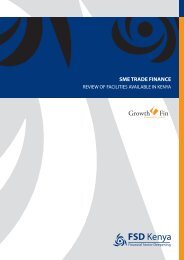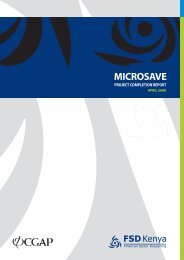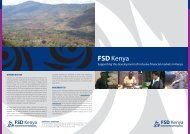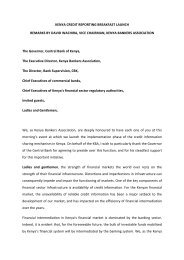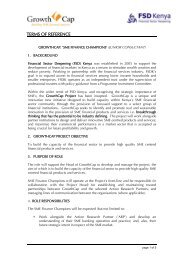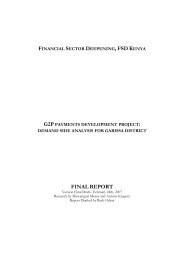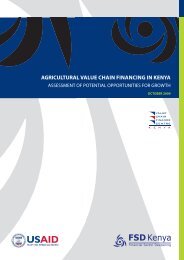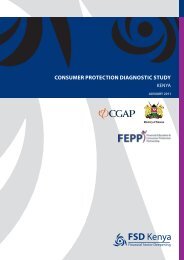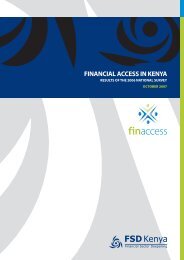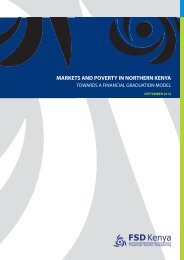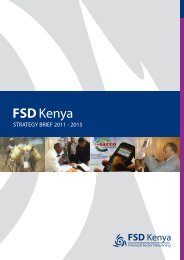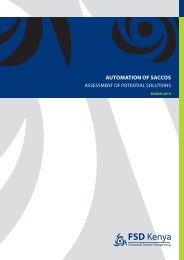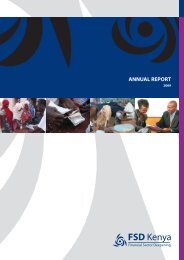fsd's financial education programme: evaluation and ... - FSD Kenya
fsd's financial education programme: evaluation and ... - FSD Kenya
fsd's financial education programme: evaluation and ... - FSD Kenya
Create successful ePaper yourself
Turn your PDF publications into a flip-book with our unique Google optimized e-Paper software.
10 • <strong>FSD</strong>’S FINANCIAL EDUCATION PROGRAMME: EVALUATION AND RECOMENDATIONS<br />
Targets <strong>and</strong> impact:<br />
• The targets for the four pilots were all set in terms of quantity (number<br />
of people reached). Some were unrealistic given the time available,<br />
particularly that of Plan. Chasing quantity then also often lead to poor<br />
execution.<br />
• Notably, no consideration was given to frequency of reach (a critical<br />
component of any communication campaign). An effective <strong>financial</strong><br />
literacy approach would have as an output one or more of the following:<br />
creating awareness, improving knowledge, transferring skills, influencing<br />
attitudes, <strong>and</strong> ultimately changing behaviour. It is near impossible to<br />
transfer knowledge or skills with a single exposure (the typical didactic<br />
model) <strong>and</strong> even more so to influence attitudes <strong>and</strong> behaviour with<br />
once-off exposure. Improving <strong>financial</strong> capability is a long term on-going<br />
process, requiring multiple exposures <strong>and</strong> reinforcement over time.<br />
•<br />
It is also known that attitudes <strong>and</strong> behaviour tend to revert back (without<br />
continuous exposure/reinforcement). A proper <strong>evaluation</strong> of <strong>programme</strong>s<br />
will require revisiting the target market after a period of time to assess<br />
whether or not the impact of the <strong>programme</strong> has been lasting.<br />
•<br />
•<br />
Consumer strategy: while research was undertaken around the individual<br />
<strong>programme</strong>s, it remains unclear on what basis these pilots were selected,<br />
as there was no high-level national consumer strategy or dem<strong>and</strong>-side<br />
data/baseline to inform the selection of these pilots. It therefore appears<br />
as though these were supply rather than dem<strong>and</strong>-driven – a major<br />
strategic oversight. Pilots are in essence a tactic <strong>and</strong> should stem from<br />
a carefully crafted strategy <strong>and</strong> dem<strong>and</strong>-side research, not the other<br />
way around. It appears as though this excessive focus on pilots <strong>and</strong> lack<br />
of strategic focus stem from the Scoping Exercise. This set the basis for<br />
the <strong>programme</strong> design <strong>and</strong> was further reinforced by the DFID-funded<br />
Financial Education Fund (FEF) that was launched around the same time<br />
as the FinEd.<br />
Content: there has been limited sharing of the content of these pilots<br />
(apart from between Faulu <strong>and</strong> Media-e). As the pilots were co-funded<br />
<strong>and</strong> seemingly customised on an institutional level, it is doubtful that<br />
there will be any sharing of the content <strong>and</strong> materials in future. Ironically,<br />
it seems that there was no formal sharing of lessons learnt following<br />
the pilots. The pilots (primarily the M&E) ran over time <strong>and</strong> were only<br />
Table 6: Pilots - outputs, activities <strong>and</strong> achievements<br />
Output Activities Achievements<br />
Potentially viable<br />
approaches for the<br />
delivery of <strong>financial</strong><br />
<strong>education</strong> piloted<br />
Overall: partially<br />
achieved<br />
1. Review international <strong>and</strong> <strong>Kenya</strong>n experience on ways to deliver <strong>financial</strong><br />
<strong>education</strong> addressing priorities, encompassing lessons from other<br />
sectors<br />
2. Identify potential for pilot projects <strong>and</strong> champions across the range of<br />
potential delivery channels addressing priority market segments with<br />
potential for scale-up <strong>and</strong> sustainability<br />
3. Support the development of a pilot research protocol to cover key<br />
partners, overall objectives, timetables, location/logistics/materials,<br />
content, quantifiable targets <strong>and</strong> <strong>education</strong> methodology<br />
4. Undertake market research with target markets to identify needs <strong>and</strong><br />
establish base-line knowledge, skills, attitudes <strong>and</strong> behaviours/practices<br />
Unclear whether this was undertaken<br />
Underachieved: limited channels; no process of<br />
identifying market segments or prioritising these –<br />
supply-driven approach in selection of pilots<br />
Achieved<br />
Achieved<br />
5. Support the development of relevant content/curricula for pilot projects Achieved<br />
6. Undertake training of relevant staff in pilot institutions Achieved<br />
7. Develop relevant materials for implementation<br />
8. Implement pilot activity with regular monitoring of performance <strong>and</strong><br />
sharing of experience between pilot activities<br />
9. Undertake follow-up survey to evaluate based on changes in<br />
knowledge, skills, attitudes <strong>and</strong> practices of target markets<br />
Achieved – although quality <strong>and</strong> relevance of material<br />
not known<br />
Achieved<br />
Underachieved – methodological problems; timeline<br />
exceeded



